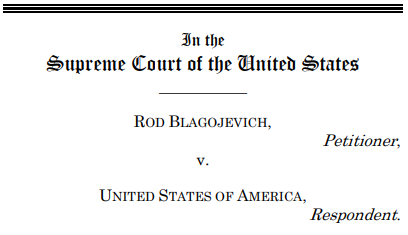A quarter century ago, in McCormick v. United States, this Court cabined the application of the Hobbs Act, a statute of long standing that prosecutors gradually began to use in bribery cases. As Petitioner’s case shows, it is even used in bribery cases where the “quid” is simply a donor’s campaign contribution to a candidate, and the “quo” is some official act by the candidate-officeholder. From today’s vantage, American politics in 1991 seems almost placid, but, even then, the Court was concerned that a broad and fuzzy conception of the bribery and extortion crimes “would open to prosecution not only conduct that has long been thought to be well within the law but also conduct that in a very real sense is unavoidable so long as election campaigns are financed by private contributions or expenditures, as they have been from the beginning of the Nation.” Id. at 272. Any consumer of news knows that what was probably true in 1991 is a near certainty in 2017.
The McCormick majority decided that the text of the Hobbs Act could support a cabining construction that would avoid reaching a large swathe of campaign contributions in which donors and candidates talk about issues. These discussions and contributions have the salutary effect of motivating candidates to push in the same direction as their constituents. The criminal law would only concern itself with contributions given in exchange for the candidates’s “explicit promise or undertaking” to take (or not take) an official act. Id. at 273. The campaign finance law, meanwhile, would patrol the parapets, continuing to serve as a prophylaxis by shining a light on the transactions and prohibiting or limiting those contributions in which a substantial risk of quid pro quo corruption can, with precision, be avoided. That is the anti-corruption regime.
The driving force of McCormick, then, was its view of the realities of campaign finance—a vast and roiling playground in which the First Amendment sets the rules. It is odd and even unfortunate that McCormick did not cite any of the Court’s campaign finance cases—a judgment that is easier to make in retrospect given the severe and long-standing circuit split identified by the Petitioner. Amicus respectfully suggests that this case presents the ideal vehicle to clarify the First Amendment and Due Process concerns that truly undergird McCormick’s cabining construction. As shown in Part I, below, a line of post-1991 authority, including the Wisconsin Right to Life, Inc. case, is now available to aid in this relatively straightforward project. Ultimately, this will not only resolve the circuit split, it will provide clarity for defendants—perfectly exemplified by Petitioner, but also potentially including all of the First Amendment speakers described in Part II— whose campaign financing conduct is susceptible to second-guessing under the vague, overbroad standard that McCormick had apparently rejected. For these reasons, amicus respectfully asks that the petition be granted.
Read Full Brief














